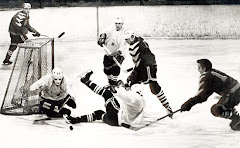This weekend I watched the 2008 HBO documentary Thrilla in Manila. The story of the third Muhammad Ali - Joe Frazier fight from the Philippines in 1975 is so compelling that it would almost be impossible to make an unwatchable documentary about the subject. Director John Dower comes close, however-- Thrilla in Manila is little more than an 86 minute hatchet job on Ali that I found incredibly difficult to watch.
As a kid, I started following boxing in the mid-1970s, and I remember not liking Muhammad Ali-- too young to understand the social and political context in which he boxed, I saw him as a loudmouth and a bragger. I knew nothing about Ali's outspoken resistance to racism and white supremacy, his conversion to Islam, or his refusal to take part in the US war against the people of Vietnam. I almost always rooted for Ali's opponents-- especially Leon Spinks (who had the added appeal of being from my hometown of St. Louis). The only thing that gave me pause in my anti-Ali feelings was the fact that my mother, who otherwise never showed much of an interest in or opinion about professional sports, sometimes expressed admiration for Ali.
I was looking forward to watching this documentary, but almost from the first minute, it became obvious that Thrilla in Manila was going to be nothing but a hate-letter to Muhammad Ali. It rehashes a bizarre set of new and old accusations in an attempt to belittle Ali-- Ali as a puppet of the Nation of Islam; Ali as a supporter of the KKK; Ali as a chronic womanizer; Ali as a supporter of Philippines dictator Ferdinand Marcos; and, above all, Ali as a hateful bully towards Joe Frazier. Frazier is interviewed throughout the film and clearly was bitter and angry towards Ali many years later, not just for being called an "Uncle Tom" and a "gorilla" back in the seventies, but also for the wealth and prestige that Ali has continued to enjoy in his retirement. (Frazier, in contrast, lived the last years of his life in a small apartment in the same building as the gym he ran in Philadelphia.)
The most ugly and disturbing part of the movie actually comes early on when Joe Frazier claims that Ali's current health problems with Parkinsons are some sort of divine retribution for his name calling against Frazier. After that, it was hard to take any of it seriously, which is a genuine shame. The great Ali-Frazier rivalry desperately needs a great documentary to put it in its full context-- Thrilla in Manila is absolutely not that movie.
Trailer for the film
1974 appearance by Ali and Frazier on Wide World of Sports that ends in a brawl
What appears to be a staged phone call between Frazier and Ali
Ali and Frazier on the Mike Douglas Show








No comments:
Post a Comment